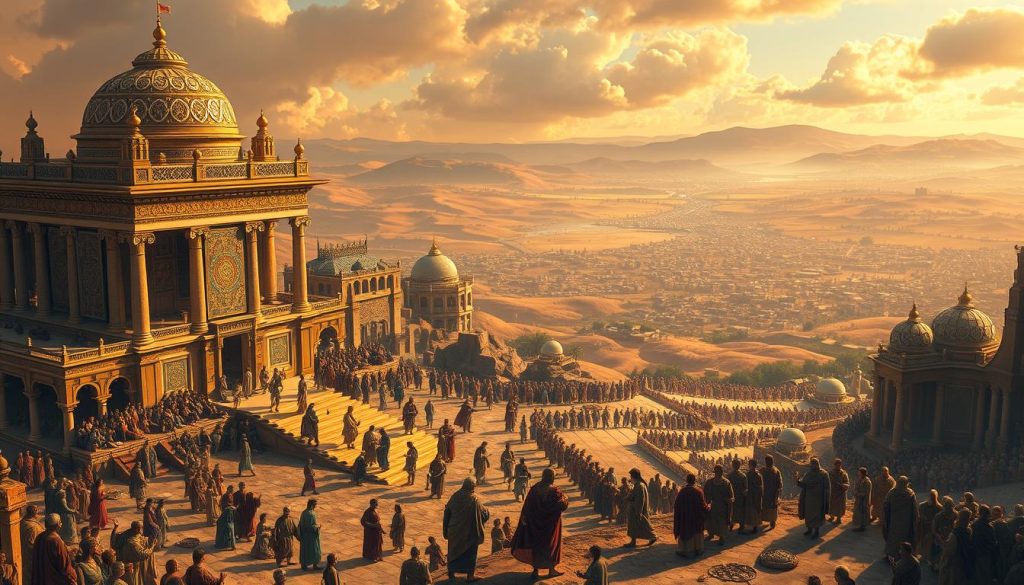The story of David is a key part of ancient history. It tells of a young shepherd who became a legendary king. His journey offers deep insights into leadership, spirituality, and culture in the ancient Near East.
David was a complex figure. He started as a shepherd and became a respected king. His life shows how leadership and spirituality can change history.
Looking at David’s life, we see him as a warrior, poet, and prophet. His story gives us a glimpse into ancient Israel’s society and politics. It shows how one person can change a whole society.
Key Takeaways
- David transformed from a shepherd to a powerful monarch
- His life significantly impacted ancient Near Eastern civilization
- David embodied multiple roles: warrior, poet, and spiritual leader
- His story represents a critical junction in historical religious narratives
- David’s legacy continues to influence multiple faith traditions
Introduction to David/Dawud: An Overview of His Significance
David is a key figure whose story goes beyond just history. His life shows a deep journey of leadership, spiritual growth, and cultural importance in many Abrahamic traditions.
David’s story touches on many aspects of human life. He is seen as a symbol of bravery and faith. His family line, through Jesse, made him a significant figure in ancient Israel.
Role in Abrahamic Faiths
David’s importance is seen in three major religions:
- In Judaism, he is the ideal king and a messianic figure.
- For Christians, he is an important ancestor of Jesus.
- In Islam, he is a respected prophet and leader.
Historical Context of His Life
David started as a simple shepherd. His background was in ancient Canaan’s social and political scene. His rise from a humble shepherd to a national leader shows his incredible journey.
Symbolism in Literature
David’s life has inspired many books and stories. His story covers themes like:
- Overcoming challenges
- Staying strong in faith
- Being a complex leader
His story is loved across cultures and time. It shows the common human struggles, faith, and redemption.
David’s Early Life: From Shepherd to Soldier
David’s story starts in Bethlehem, a small town. He went from being a humble shepherd to a legendary warrior. This change would deeply impact the traditions of his nation.
He was born into the family of Jesse, the youngest of eight sons. This detail played a big role in his journey to greatness.
David grew up in ancient Israel’s pastoral culture. As a shepherd, he learned skills that were key to his future. His job was more than just watching sheep:
- Protecting the flock from predators
- Navigating challenging terrain
- Demonstrating exceptional courage and resourcefulness
Ancestry and Family Background
David came from a family that valued hard work and devotion. His family’s traditions in Bethlehem made him an unlikely hero. His father overlooked him, but he was chosen for a remarkable destiny.
The Legendary Encounter with Goliath
David’s most famous moment was against the Philistine giant Goliath. He showed incredible courage. With just a sling and faith, he defeated a seasoned warrior.
This moment made David a national symbol of bravery. It also showed the cultural traditions of resilience in his life.
The Reign of David: Establishing the Kingdom of Israel
David became king and changed Israel’s history. He brought together tribes that were once divided. His leadership during the Antiquity period made Israel a strong kingdom.
- Diplomatic negotiations with tribal leaders
- Strategic military conquests
- Creating a centralized governmental structure
- Establishing Jerusalem as the capital city
Unification of Israel and Judah
David was great at bringing people together. He worked hard to unite Judah and the northern tribes. This made Israel a single, strong nation.
Military Campaigns and Expansion
David was a skilled warrior. He expanded Israel’s borders by defeating nearby kingdoms. This made Israel a powerful force in the ancient world.
Political and Administrative Achievements
David did more than just win battles. He created a well-organized government and military. He also built diplomatic ties that lasted for many years. His leadership was an example for future rulers.
David as a Poet: Contributions to the Psalms
David’s legacy goes beyond his military and political wins. He is celebrated as a deep poet who changed how we express our faith. Known as the “sweet psalmist of Israel,” his poems have shaped religious practices in many faiths.

David’s poems show a wide range of emotions, touching on faith, struggle, and redemption. Even though some question who wrote them, these psalms show great depth and spiritual insight.
Authorship of Selected Psalms
Traditionally, David is said to have written many psalms. But today, scholars look at this with a more careful eye. His poetic legacy includes:
- Psalms full of deep devotion
- Lyrical pieces about spiritual battles
- Poems that tell stories of God’s relationship with us
Themes within His Poetry
David’s poems touch on themes that are timeless. They often talk about:
- God’s protection
- Being open and vulnerable
- Changing spiritually
- Hope for redemption
Impact on Religious Practices
David’s poetry has a lasting impact. It speaks to universal spiritual experiences. His psalms help shape worship in many religious communities, giving them words and feelings to express their faith.
David as a Prophet: Spiritual Insights and Guidance
David’s journey as a prophet was a key moment in religious history. It went beyond just being a leader. His spiritual guidance shaped ancient Israel, giving deep insights into how to understand God.
David’s role as a prophet was more than just a story. His spiritual contributions touched many aspects of religious life:
- Receiving divine revelations
- Communicating spiritual wisdom
- Providing moral and ethical guidance
- Interpreting divine messages
Prophetic Revelations in Sacred Texts
In the Hebrew Bible, David stands out as a unique prophet. His spiritual insights were marked by deep emotional introspection and a strong connection to divine principles. The Psalms, often credited to David, show incredible spiritual depth. They explore themes of human weakness, redemption, and the relationship with God.
Comparative Prophetic Understanding
David’s prophetic status is unlike others. Unlike traditional prophets, who mainly delivered messages, David combined spiritual guidance with political leadership. His method of prophecy mixed personal spiritual experiences with societal change. This made him a true example of inspired leadership in ancient times.
Impact of Divine Guidance
The spiritual revelations David received deeply influenced Israelite religious practices. His prophetic insights led to a more personal and introspective way of understanding God. This approach set a precedent that would echo through later religious traditions.
David’s Legacy: Cultural and Historical Impact

David’s legacy goes beyond history, touching many cultures. His story has inspired art, literature, and stories in many places. It shows how his life has shaped the world we see today.
Influence in Art and Literature
David’s life has sparked creativity in many. Artists and writers have seen his story in different ways:
- Renaissance paintings show his biblical moments.
- Epic poems celebrate his heroic journey.
- Modern novels explore his complex side.
- Sculptures capture his legendary moments.
Representation in Popular Media
Today, David’s story is seen in many ways. Movies, music, and more have brought his life to life. His story keeps captivating people everywhere.
Enduring Symbol of Leadership
David is seen as a great leader. Leaders, scholars, and thinkers often look to him. His rise from shepherd to king shows growth and change.
David’s lasting impact shows how one person can inspire many. His courage, strength, and spiritual depth continue to inspire us all.
Theological Perspectives on David’s Life
David is a key figure in Abrahamic religions, showing leadership, spirituality, and cultural importance. His story offers deep insights into faith and human life.
David’s story is seen across many religions, creating a rich spiritual view. It shows his amazing journey.
Views from Christianity
In Christianity, David is seen as a key part of Jesus’ story. His royal blood connects him to Jesus. Christians see him in several ways:
- Prophetic predecessor to Christ
- Royal ancestor in the divine plan
- Symbolic representation of spiritual leadership
Interpretations in Islam
In Islam, David is a king and a prophet of Allah. The Quran says he was a wise ruler. Important points about him include:
- Powerful monarch guided by spiritual principles
- Recipient of divine revelations
- Model of just governance
Jewish Understanding of David’s Role
In Judaism, David is seen as a great leader and poet-king. Jewish texts show his deep spirituality and national role. Key points about him are:
- Messianic lineage founder
- Exemplary spiritual warrior
- Transformative national leader
These views show David’s life inspires and challenges many religions. His legacy continues to touch hearts and minds.
Historical Accuracy: Separating Fact from Legend
The life of David is a mystery in ancient history. Scholars and archaeologists try to find the truth behind the legendary biblical figure. They look at evidence that shows both myth and reality.
Researchers have found important archaeological discoveries. These discoveries give us a peek into David’s possible real existence. The Tel Dan Stele, an ancient stone, is a key piece of evidence in this search.
Archaeological Evidence Revealing David’s Existence
- The Tel Dan Stele mentions “House of David”
- Inscriptions from the 9th-8th centuries BCE hint at royal lineage
- Remains from David’s time have been found
Comparing Historical Accounts
The Bible paints a complex picture of David. It’s hard to understand him just by reading the Bible. Some see him as a myth, while others believe he was a real king.
Scholarly Perspectives
- Archaeological studies offer more detailed insights
- Looking closely at the texts helps us understand the Bible better
- Working together, different fields help fill in the gaps
Finding out about David’s real life is a never-ending job for scholars. It shows how hard it is to understand ancient stories and evidence.
Conclusion: The Enduring Influence of David/Dawud
David’s journey through history is truly remarkable. It goes beyond religious boundaries, making him a key part of global culture. His story is one of change, from a simple shepherd to a mighty king. It shows resilience, spiritual depth, and complex human experiences that touch many lives.
David’s impact is vast and far-reaching. His legacy is seen in many areas, like religion, art, and philosophy. As a key figure in Judaism, Christianity, and Islam, he stands for leadership, creativity, and spiritual reflection. His psalms offer deep insights into our connection with God and our own vulnerabilities.
Today, we learn a lot from David’s life. His battles with power, his moral dilemmas, and his journey to redemption teach us about being human. David’s story shows how one person’s life can inspire others to grow, understand their spirituality, and lead with integrity.
In the end, David is more than just a historical figure. He is a symbol of what humans can achieve. His life story challenges and inspires people from all faiths. It reminds us that true leadership comes from being real, spiritually committed, and dedicated to personal growth.